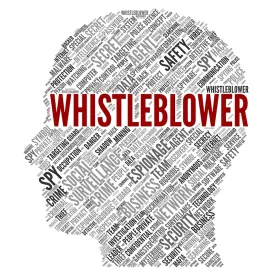With a recent decision from the California Supreme Court, Lawson v. PPG Architectural Finishes, 503 P.3d 659 (Cal. 2022), whistleblowers in California will face fewer legal obstacles when claiming that their employer retaliated against them for their whistleblowing activities.
California’s whistleblower protection law, codified under California Labor Section 1102.5, protects private and public employees from retaliation. Section 1102.5 prohibits an employer from retaliating against an employee when the employer believes that the employee disclosed information to a government or law enforcement agency or to a supervisor or other person with authority to investigate, or that the employee provided information or testimony to any public body conducting an investigation. Cal. Lab. Code § 1102.5(b). The employee must have a reasonable belief that the employer was engaging in conduct that violated a state or federal law, rule, or regulation. The statute also prohibits an employer from retaliating against an employee for refusing to participate in an activity that would result in a violation of a state or federal law, rule, or regulation. Cal. Lab. Code § 1102.5(c). Section 1102.5 creates a private right of action for California whistleblowers who face retaliation for reporting wrongdoing against their employers.
In Lawson, the plaintiff sued his former employer in federal court under section 1102.5 and claimed that he was terminated for reporting allegedly fraudulent conduct at his employer. Lawson, 503 P.3d at 660-61. In response, his employer asserted that the plaintiff was terminated because of poor performance, not because he engaged in protected activity. Id. at 661. The district court ruled in the employer’s favor and Lawson appealed to the Ninth Circuit. Id. The question of causation – whether the plaintiff was terminated because he engaged in whistleblowing – was pivotal to determining liability, yet courts in California had not yet decided which causation framework to apply to section 1102.5 whistleblower claims. Id. The Ninth Circuit therefore certified this important question of which standard to apply to section 1102.5 claims to the California Supreme Court. Id.
The California Supreme Court in Lawson considered two different standards that courts had applied to section 1102.5 claims: the contributing factor standard and the burden-shifting framework established in McDonnell Douglas Corp. v. Green, 411 U.S. 792 (1973). Under the McDonnell Douglas framework, the employee has the ultimate burden of demonstrating that the reason the employer provided for the termination is pretextual, and thus that retaliation was the but-for cause of the termination. Under the contributing factor standard, the employee need only show that the employee’s protected activity contributed to the employer’s decision to terminate the employee. As explained by the Court in Lawson, “This means plaintiffs may satisfy their burden of proving unlawful retaliation even when other, legitimate factors also contributed to the adverse action.” Lawson, 503 P.3d at 664. The Court ruled that the contributing factor standard should apply to whistleblowers’ claims under section 1102.5.
In so concluding, the California Supreme Court explained that, in 2003, nearly three decades after the enactment of section 1102.5, the California legislature amended the whistleblower protections, following a series of high-profile corporate scandals, such as Enron and others. Id. at 662. The 2003 amendments added a procedural provision that stated that the plaintiff must establish by a preponderance of the evidence that the protected activity was a “contributing factor in the alleged prohibited action against the employee” and then the employer “shall have the burden of proof to demonstrate by clear and convincing evidence that the alleged action would have occurred for legitimate, independent reasons” even if the employee had not engaged in whistleblowing activity. Cal. Lab. Code § 1102.6. Even after enactment of this provision, courts in California continued applying the McDonnell Douglas framework to whistleblower retaliation claims. The Court in Lawson therefore clarified that, consistent with the intent of the California legislature, the framework outlined in section 1102.6 applied to whistleblower claims under section 1102.5. Id. at 667. The Court reasoned that this outcome was consistent with the California legislature’s objective when it enacted specific procedural protections for California whistleblowers, namely to “encourage earlier and more frequent reporting of wrongdoing by employees and corporate managers when they have knowledge of specific illegal acts.” Id. at 666.
California is not unique in applying the contributing factor standard to whistleblower retaliation cases. The contributing factor standard is the same standard used in whistleblower retaliation claims under the Sarbanes-Oxley Act, 18 U.S.C. § 1514A, and other industry-specific whistleblower anti-retaliation statutes, such as the Federal Railroad Safety Act (FRSA) and the Wendell H. Ford Aviation Investment and Reform Act (AIR21). Courts analyzing claims under these other statutes have explained that the contributing factor standard means “any factor, which alone or in connection with other factors, tends to affect in any way the outcome of the decision.” Rookaird v. BNSF Railroad Company, 908 F.3d 451, 461 (9th Cir. 2018). This standard, unlike that under McDonnell Douglas, is more lenient and affords whistleblowers greater protections from retaliation. Cases analyzing the contributing factor standard in these contexts will certainly be helpful in guiding California courts when they analyze claims under section 1102.5.
With the California Supreme Court’s ruling in Lawson, whistleblowers who face retaliation for reporting potentially fraudulent or illegal activity against their employers in California will enjoy stronger protections. As for Lawson, the Ninth Circuit remanded his case to the federal district court to apply the correct causation standard in evaluating his case. Lawson v. PPG Architectural Finishes, Inc., No. 19-55802, 2022 WL 396025 (9th Cir. Feb. 9, 2022).


 />i
/>i
